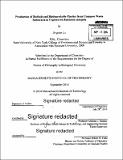Production of biofuels and biodegradable plastics from common waste substrates in engineered Ralstonia eutropha
Author(s)
Lu, Jingnan, Ph. D. Massachusetts Institute of Technology
DownloadFull printable version (34.95Mb)
Other Contributors
Massachusetts Institute of Technology. Department of Chemistry.
Advisor
Anthony J. Sinskey.
Terms of use
Metadata
Show full item recordAbstract
Ralstonia eutropha, a Gram-negative proteobacterium, is capable of utilizing a plethora of simple and complex carbon sources derived from common waste streams. When experiencing nutrient stress in the presence of high carbons, R. eutropha can store carbon and energy in the form of polyhydroxyalkanoates (PHAs), a biodegradable and biocompatible plastic. In this thesis, the native carbon storage system was genetically disabled and the carbons redirected to produce biofuels. Key enzymes involved in R. eutropha CO₂, oil, and branched-chain amino acid metabolism were evaluated for the production of biofuels and bioplastics. R. eutropha valine biosynthesis pathway was modified, so its intermediate 2- ketoisovalerate can be converted to isobutanol, a drop-in biofuel that can directly substitute for fossil-based fuels and be employed within the current transportation infrastructure. Challenges facing large production of isobutanol include the tightly regulated biosynthetic pathway and product toxicity to the cells. Modification of both the pathway enzyme for reduced-feedback inhibition, in addition to genotypic adaptation to exogenous isobutanol stress produced insights that will allow for further improvements on isobutanol production. Furthermore, strains of R. eutropha were also engineered to produce isopropanol, another biofuel. Growth on carbon dioxide requires carefully balanced intercellular pH and ion transport. Four R. eutropha carbonic anhydrases were identified to play individual and non-complementary roles in CO₂ metabolism. An extracellular lipase and its chaperone were identified and characterized in R. eutropha. This lipase is crucial for growth on plant oil and when overexpressed, not only reduced the growth lag phase, but also eliminated the use of supplemental surfactants. Production of PHAs was achieved by using palm oil, one of the world's most abundant plant oils, as well as vinasse, a byproduct of ethanol fermentation. Metabolic versatility and genetic tractability combined with its ability to store a variety of carbons make R. eutropha an excellent platform organism for the production of value-added compounds. Demonstrated in this thesis are the production of biofuels and bioplastics from fructose, CO₂, oils, and mixed-organic acids.
Description
Thesis: Ph. D. in Biological Chemistry, Massachusetts Institute of Technology, Department of Chemistry, 2014. Cataloged from PDF version of thesis. Vita. Includes bibliographical references.
Date issued
2014Department
Massachusetts Institute of Technology. Department of ChemistryPublisher
Massachusetts Institute of Technology
Keywords
Chemistry.